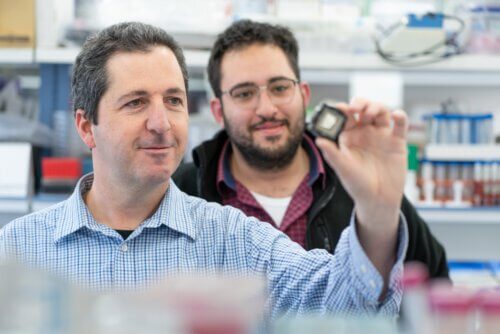The team of researchers led by Prof. Yaakov Nachmias from the Hebrew University developed a kidney-on-a-chip system that contains tiny sensors that report the direct effect of drugs on human tissue. The technology has allowed the team to develop a new drug to prevent renal shunt in chemotherapy treatments on human tissues

A new study led by Prof. Yaakov Nachmias, head of the Center for Bioengineering at the Hebrew University and founder of the Tissue Dynamics company, published in the prestigious journal Science Translational Medicine, the researchers developed a kidney-on-a-chip system that contains tiny sensors that report the direct effect of drugs on human tissue. The technology has allowed the team to develop a new drug to prevent renal shunt in chemotherapy treatments on human tissues. The technology makes it possible for the first time to eliminate the use of laboratory animals for experimental purposes.
Developing medicines and bringing them to market is a long process, full of obstacles and expensive. On average, the development of one drug costs the pharmaceutical industry about 2.6 billion dollars and takes about 12 years to bring it to market. One of the main problems in the field is the inability to predict the behavior of a drug in humans from experiments on mice and rats. Laboratory animals have different genetics and physiology than humans, which is why drugs that are effective in mice repeatedly fail in clinical trials.
organ on a chip
Organ on a chip technology was born 30 years ago to replace animal experiments with human tissues. However, even though such systems are already on the market, it has not yet been proven that they can significantly shorten the path to drug development. Prof. Nachmias' breakthrough was in the combination of tiny sensors that are embedded in human tissue and make it possible to measure in real time the rate of metabolism in tissues such as liver, kidneys and heart. The precise measurements allowed the Hebrew University team to obtain reliable real-time information on the mechanism of action of various drugs and chemicals in the kidneys.
Using the new technology, Prof. Nachmias and PhD student Aharon Cohen discovered a new mechanism for the toxicity of one of the drugs commonly used in chemotherapy treatments (cisplatin) which causes kidney damage in more than 30% of the patients treated with it. "Our system showed that cisplatin interferes with the passage of sugar in the kidneys and therefore causes fat accumulation and damage. A quick scan showed that empagliflozin, a drug that prevents the absorption of sugar in the kidneys, prevents the damage and makes chemotherapy safer," said Prof. Nachmias.
A drug combination instead of a drug that damages the kidneys
Cisplatin, a platinum-based drug, has been in use for over 40 years and is still considered one of the most common drugs used in chemotherapy treatments, for patients with ovarian, stomach, lung, head or neck, bladder and testicular cancer. The kidney damage caused by the use of cisplatin limits its use to only a few days in each chemotherapy treatment. Prof. Nachmias' discovery led him together with the Tissue Dynamics company that commercialized the technology for a retrospective clinical study of 247 patients at Hadassah Hospital, which confirmed the results of the study. "Actually, almost no kidney damage was measured in cancer patients who took our drug combination" claimed Prof. Nachmias.
This is the first time that researchers use the technology of an organ on a chip to develop a drug from the initial stage to a clinical trial without the use of laboratory animals. According to Prof. Nachmias, "This groundbreaking technology can not only shorten the time it takes essential medicines to reach the shelf, but also eliminate a large part of the experiments on laboratory animals, which will save money, time and a lot of suffering. The company Tissue Dynamics that we recently established continues to develop innovative tools for drug development, and is already making progress with the new drug combination for cancer for clinical trials and regulatory approval."
More of the topic in Hayadan:
- Researchers from the Hebrew University and Mount Sinai Hospital in New York cracked the replication mechanism of the corona virus and found an existing drug that attacks it
- Prof. Yair Reisner from the Weizmann Institute of Science and Dr. Jacob Nachmias from the Hebrew University won the Rapoport Award for Biomedicine
- The electronic nose of Dr. Hussam Hayek of the Technion also smells kidney diseases
- Israeli and American researchers have identified a region in the DNA that contains a common genetic factor that increases the risk of kidney disease
